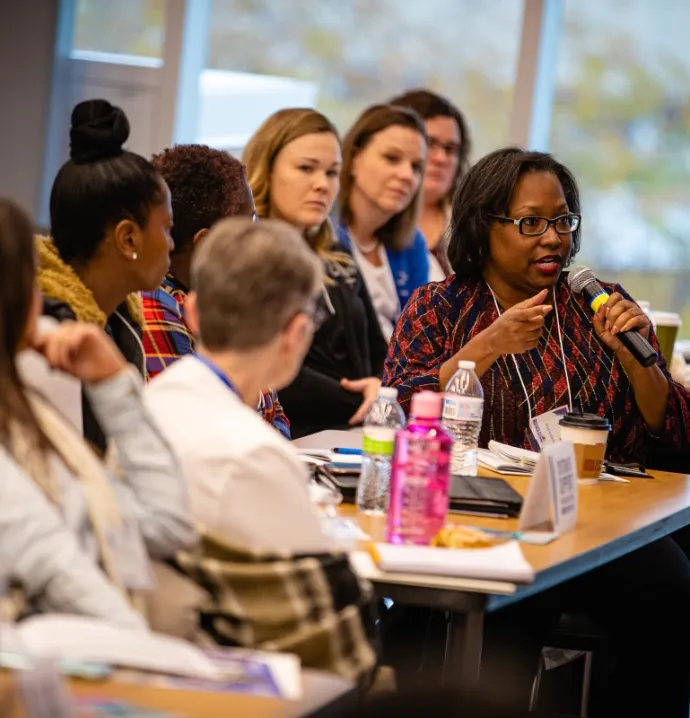Shaping Tomorrow
Shaping Tomorrow

If there’s one thing certain about higher education, it’s that it never stands still. It’s always evolving to meet the needs of the times.
This is especially true in the College of Social and Behavioral Sciences, where faculty and departments are continuously adapting curriculum to stay relevant, whether by addressing workforce needs in Iowa, diversifying career pathways or finding creative ways to engage Gen Z students.
Today, many courses in the college have been reimagined to provide hands-on, community-based learning that tackles real-world challenges.
Some programs are undergoing complete transformations to align with industry demands, while nearly all now include internship or field experience components, ensuring students gain practical exposure to careers in their areas of study.
Why? Because education isn’t just about learning — it’s about preparing students to make an impact from day one.
The Department of Family, Aging & Counseling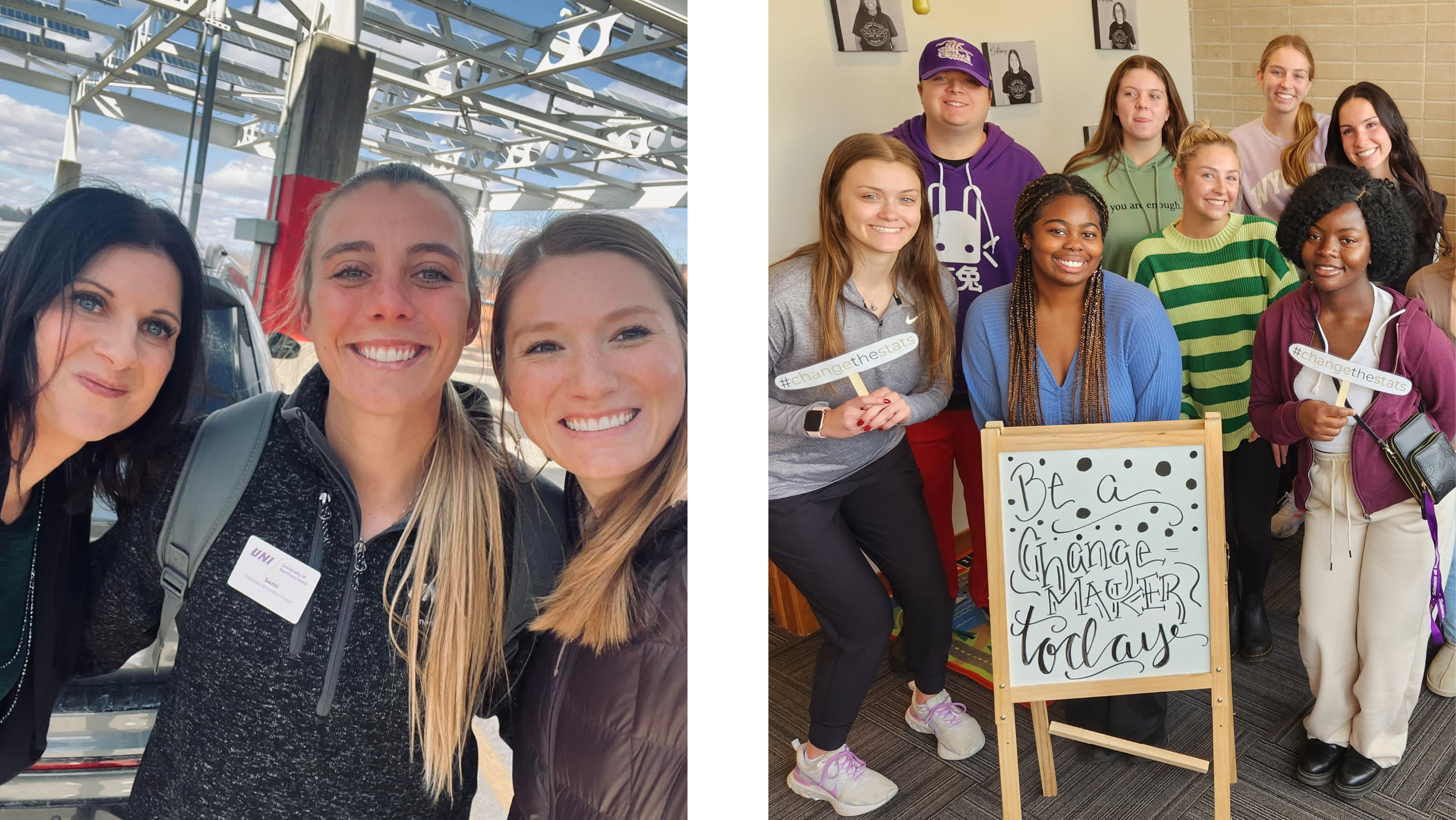
As a student, Sami Heyer, a 2024 graduate in gerontology and biology, interned at Dementia Friendly Iowa, an initiative working to make Iowa the most dementia-friendly state in the country — work that’s more important than ever.
In Iowa, many individuals with dementia live at home and are at risk of wandering or encountering dangerous situations. Dementia Friendly Iowa focuses on educating businesses and community members to recognize signs of dementia and provide support. This allows individuals to stay safe while maintaining their independence for as long as possible.
Hands-on experience with the organization provided Heyer with valuable insights into the challenges faced by those with dementia and the impact of community support.
Her internship is just one shining example of the work that Department of Family, Counseling and Aging students are doing. All programs in the department include an internship component.
“We give students the option to do the internships where they would like,” explains department head Bill Henninger. “This is because they often want to return to their hometown.”
“Many of the students end up employed at the agency where they do their internship, so in that way, we are helping with the lack of service in many rural communities.”
To better meet Iowa’s workforce needs, the department has recently restructured its offerings. It created an online human services major that provides training while allowing students to take courses remotely. At the graduate level, it also launched an online advanced certificate in mental health counseling, enabling school counselors to complete the additional coursework needed to obtain licensure.
“Both general human services and mental health counseling services are a significant need,” Henninger says. “And our gerontology program is the only undergraduate program in the state. Paired with the applied work the Dementia Simulation House does, we are the only university preparing bachelor-level students to work with older adults in various settings.”
Henninger adds that the department frequently receives feedback about its students’ motivation, kindness and ability to take on complex tasks, often solving problems with minimal oversight.
“We want an internship to be a developmental experience where students are confident and competent professionals by the end,” he says. “Almost all of our feedback suggests our students leave with that level of training. We are thankful to our community partners who take the time to mentor these students.”
The Department of Political Science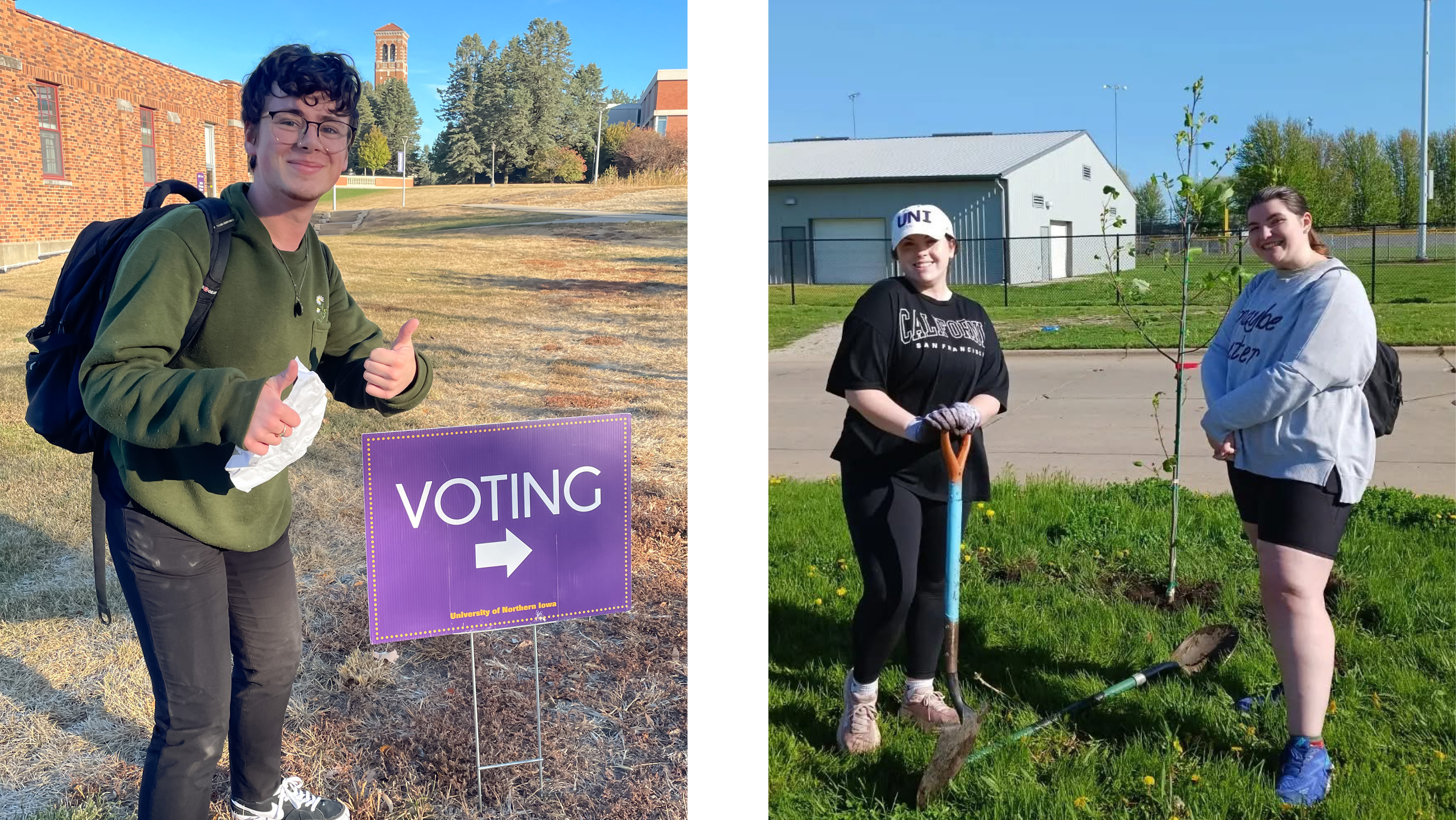
“As a department, we are very conscientious of the fact that we are preparing people who are going to go out and be leaders in their communities,” says political science department head Scott Peters. “Yes, they are preparing for the workplace, but they’re also preparing to make their communities better and richer through their involvement in organizations and community events and things like that.”
To support students on this path, the Department of Political Science offers several service-learning courses. These courses engage students in projects that develop high-demand skills across various fields.
One example is “Race and Public Policy,” where students participated in a multidisciplinary, community-based project in Waterloo examining the relationship between trees and the legacy of redlining.
The project included digital media students producing a documentary, collecting photographs for the digital archive Fortepan Iowa and planting trees in Waterloo.
Another course, “Citizen Participation and Civic Engagement,” focused entirely on Panthers Vote. Students studied voter engagement and then helped implement a new action plan for the fall 2024 election.
Yet another example is the law and politics class that’s partnering with Iowa Legal Aid in Waterloo so that students can analyze housing and eviction issues by examining national and local eviction data, studying outcomes in Black Hawk County and exploring the impact of legal representation.
Students are also gaining workforce experience through Student Government, where they have hands-on opportunities to engage in discussions on matters of public importance.
The Department of Geography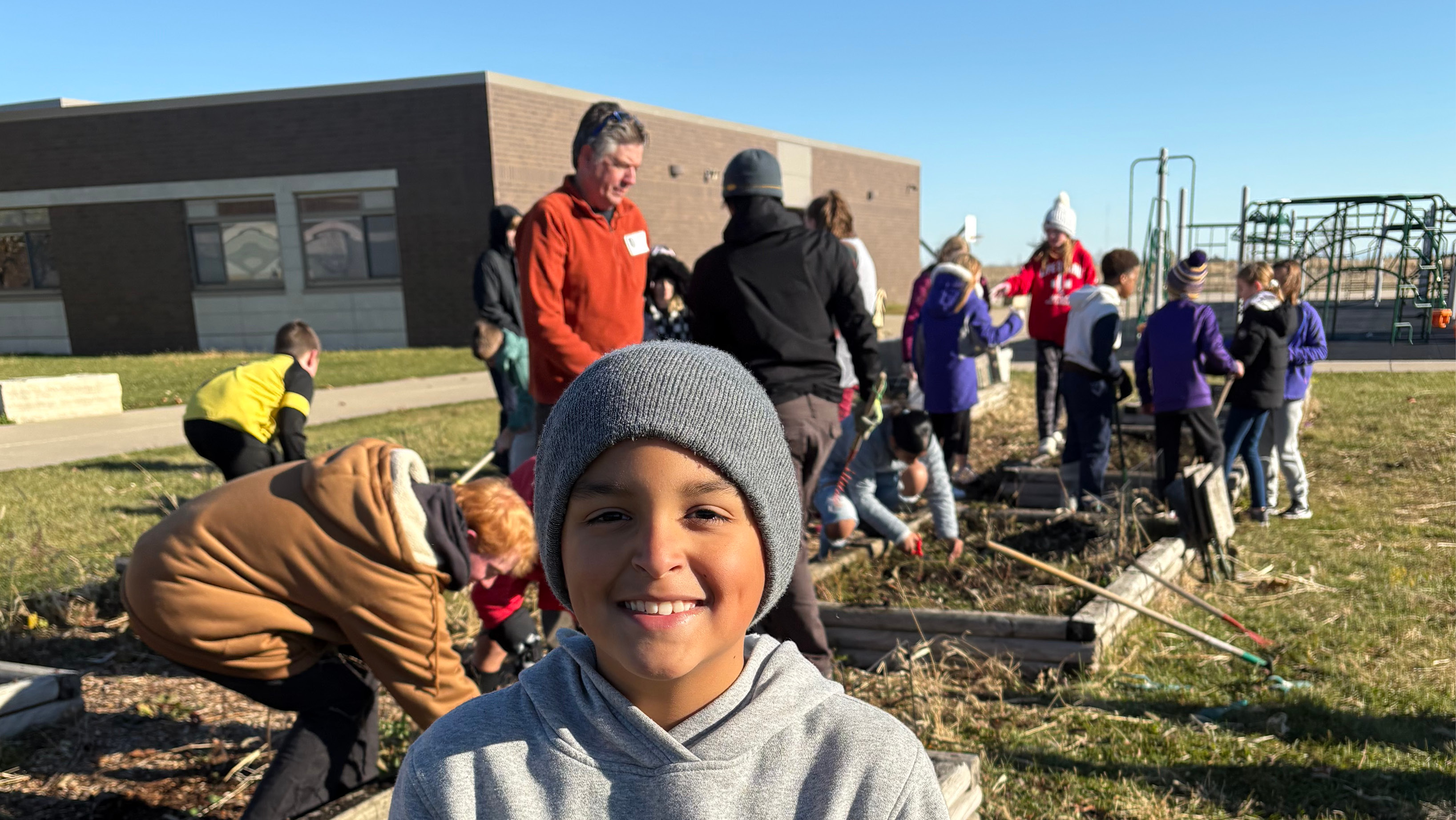
This past fall, professor Alex Oberle’s environmental geography class focused on “crowdsourcing,” or working with the public as part of scientific discovery.
He explains that in today’s world, the public can significantly contribute to scientific research because nearly everyone has a smartphone, and numerous citizen science apps are available.
Early in the semester, students tested various apps, studied the research behind them and explored best practices. For the final third of the course, they divided into groups to collaborate with local stakeholders.
At Hartman Reserve in Cedar Falls, students worked to make a complex bird migration sensor and dashboard more accessible to families. At Orange Elementary School in Waterloo, they partnered with a fifth-grade class and teacher to redesign and clean up school garden plots. They also created a garden weed guide and developed an interactive activity to help students identify insects and other organisms living in the garden soil.
“I was inspired to create this class because of citizen science work I had done for National Geographic in coordination with county conservationists across Iowa,” Oberle shares. “I wanted a class that would enlist students in using their phones to support science, create opportunities to go outside and enjoy the beautiful fall weather, meaningfully contribute to two stakeholders in the Cedar Valley, and gain practice in communicating complex information to two different public audiences.”
Service-learning courses like this one promote student learning outcomes that are difficult to achieve in a traditional classroom setting. In this case, students had to tailor their communication strategies for different audiences — families at Hartman Reserve and fifth graders at Orange Elementary. Meanwhile, community stakeholders benefited from both the time and expertise of college students.
Oberle calculated that the class contributed approximately 330 hours, split between the two projects.
“Students in this course, and in my other course that has a primary service-learning component, commonly mention how much they value doing real work for real organizations,” he says. “From my perspective, I see a high level of student teamwork and accountability that you may not have in a class where a group project is just for the instructor or the class grade. With service learning, students are committed to high-quality work because they know they represent the university and themselves, and that this isn’t just an exercise to meet the course requirements.”
A similar course, “Web Mapping and GIS,” created a web map of local food pantry access for the Northeast Iowa Food Bank. The “Climate Action Planning” courses — one for geography and another for the Master in Public Policy program — contributed policy analysis and a grant review to support the City of Fairfield’s efforts to develop a food composting program.
Students in the department also gain hands-on experience through paid internships with organizations such as the Iowa Department of Transportation, the City of Waterloo and the Iowa Department of Natural Resources.
Now, the department is working to establish an Undergraduate Research and Career Preparation Academy to systematically integrate meaningful student experiences into departmental programs and better showcase student successes.
Public Health
The public health program at UNI has evolved significantly in recent years to better meet Iowa’s workforce needs, reviewing its curriculum to align with the content and skill-related competencies required for the Certified in Public Health and Certified Health Education Specialist credentials.
It also introduced a new minor in Spanish and community health in collaboration with the languages and literature department at UNI and are in the process of developing a minor in health communication with the communication studies department. These interdisciplinary opportunities provide valuable career preparation for students across campus.
One recent course that addresses a pressing public health issue is “Planning and Evaluation,” which focuses on the theme of loneliness and isolation. This emerging public health concern poses serious risks to individuals, families and communities.
As part of the course, students partner with UNI Student Wellness Services to adapt existing programs and develop new initiatives aimed at addressing loneliness and isolation among college students.
“Public health faculty are engaged in the community and stay up to date in the field so we are aware of new issues as they arise,” explains Disa Cornish, associate professor in public health. “We work to expose our students to innovative practices and people in public health.”
When it comes to internships, Professor of Public Health Susan Roberts-Dobie explains that students gain field experience in multiple classes before starting them.
“Throughout the curriculum, they spend time with community health organizations, learning how they function and working on projects to support them. So, when they leave for their internship, they already have experience.”
The public health program has established strong relationships with local organizations where students frequently intern, including the Northeast Iowa Food Bank, the YMCA and House of Hope. However, students have also pursued internships in cities like Des Moines and Chicago and internationally in Ghana, St. Lucia and even Fiji.
“We want them to have the experience that best prepares them for their chosen path in public health,” says Roberts-Dobie.
The Department of History
From fall 2019 to fall 2024, 90% of the curriculum in the Department of History has changed, either through new courses or significant modifications to existing ones.
Department head Jennifer McNabb shares that they’ve recently focused on the teaching aspect of the history major in particular. Traditionally, the department has offered endorsements in U.S. history and world history, but to remain competitive in the job market, it formalized a way for students to earn all five social science endorsements by completing a single minor.
However, transfer students often want to move through the program efficiently, and a minor may not always be feasible. That’s why the department also developed a certificate option that adds two additional endorsements.
Another key change to the department’s curriculum is a shift in how history is studied. In the past, the department took a place-and-time-based approach, offering courses that study a particular place during a particular chronological period.
“What we realized is students sometimes don’t see an inherent value in that kind of approach to historical studies,” McNabb shares.
To better engage students, the department introduced topics-based courses designed to capture their attention and feel timely and relevant. For example, a new course called “Conflict and Justice: Terrorism” challenges students to grapple with terrorism and the role of force in the world they inhabit today. These topics courses serve as an entry point to history, enriching students’ understanding of both the past and their own experiences.
History majors can pursue a wide range of careers as they develop skills in research, problem-solving and communication. One key area is public history, which involves presenting history to various audiences in museums or historic sites and historical societies.
The department builds on this by offering students a way to gain hands-on experience early through the “Field Experience: Public History” class. This course provides 15 hours of practical learning with an Iowa historical society or museum, where students take on projects ranging from building museum displays to drafting social media content to promoting historical events.
The course also focuses on career exploration, bringing in UNI alumni to talk about their jobs and professional development since leaving the university.
“We are big enthusiasts of internships because they get students beyond campus, building a professional network and accumulating specific work experience.”
“They can document this on their resume and show potential employers how they’re job-ready because they’ve already applied their academic credentials,” McNabb says.
The Department of Kinesiology & Athletic Training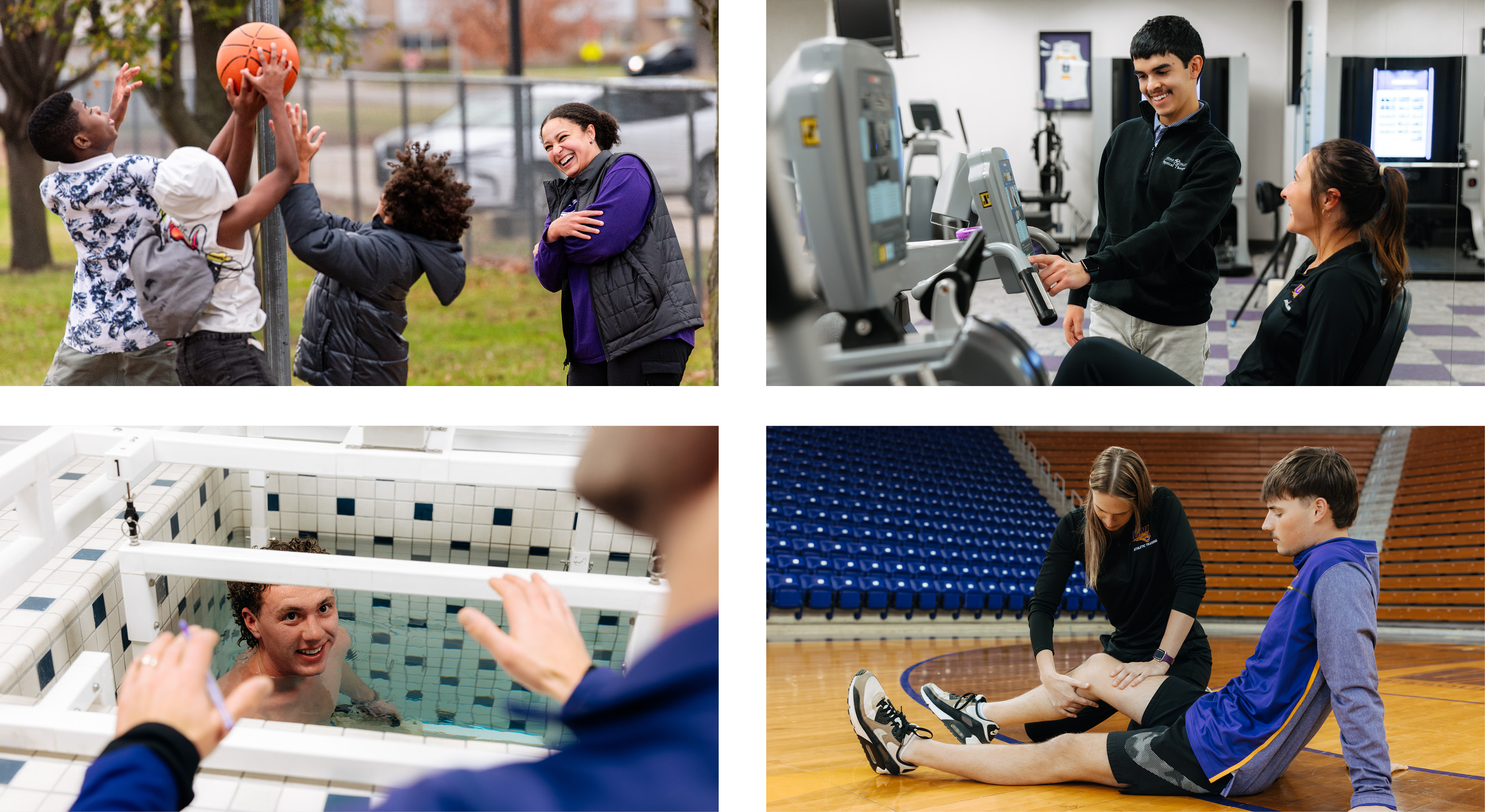
The Department of Kinesiology and Athletic Training prepares students for inherently hands-on careers in fields like physical therapy, occupational therapy and chiropractic care.
Recently, the kinesiology program underwent restructuring to offer clearly defined emphases based on students’ interests. For example, exercise science students aiming for careers in sports and fitness now receive more specialized content in those areas. Meanwhile, pre-health students planning to pursue graduate programs — such as physical therapy — take courses with a strong clinical focus, including a semester of cadaver dissection and training on prescribing exercise for patients with cardiovascular conditions.
The physical education teaching program also streamlined its curriculum, enabling transfer students to complete their degree in just four semesters.
All students in the department gain hands-on experience through internships and experiential learning. Kinesiology majors must complete three credit hours of either an internship or undergraduate research, while PE teaching students progress through four levels of field experiences in schools.
Beyond these requirements, students assist PE teachers with fitness assessments in Marshalltown — a district with a large minority population — and work with children with special needs from River Hills School during adapted physical education classes.
These experiences are instrumental in preparing students for the workforce.
“A large proportion of kinesiology students plan to continue their education into a health program,” department head Fabio Fontana explains. “Participation in research experiences strengthens their application to graduate school. And for physical education teaching students, the more experience working with students, the more prepared they will be.”




